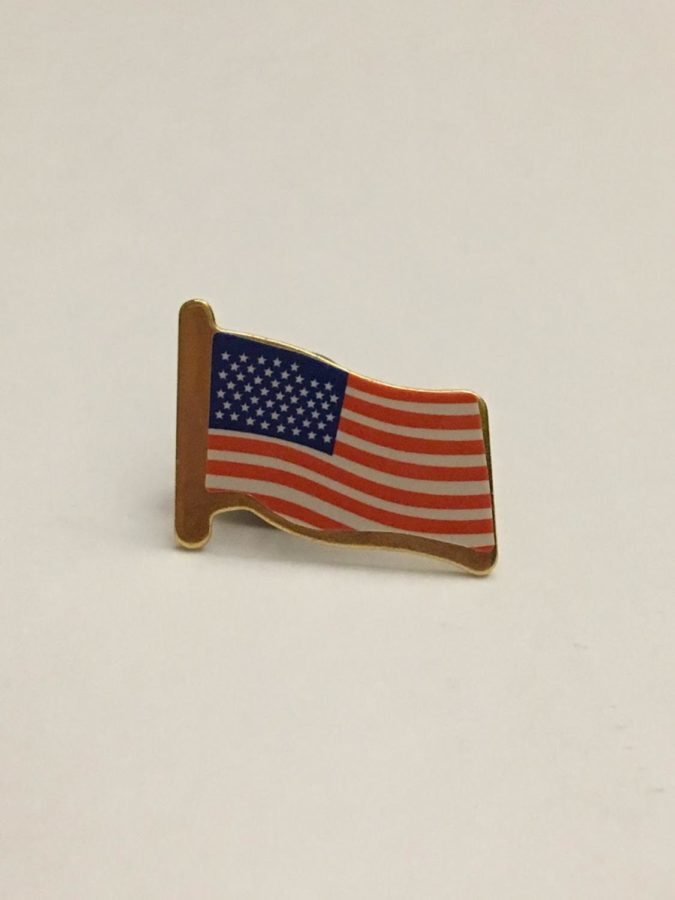What We Learn from John McCain
Picture by Mariah Gifford
September 9, 2018
A lot is happening in the political realm as of late, from Congressmen picking out the President’s favorite colors of Skittles to give to him, to Ronny Jackson dispensing prescription medication like candy; however, the death of Senator John McCain reminds us of the less trivial aspects of politics. The American political system functions and addresses the people’s concerns only when there is active participation like that of John McCain.
McCain served his country nearly all of his adult life. As a naval aviator, he served during the Vietnam War, and after serious injury, he became a prisoner of war for six years. After the war, he became politically active, serving two terms in the House of Representatives and five terms in the Senate representing the state of Arizona. McCain’s political career also included the Republican nomination for president in 2008. In these positions we remember Senator McCain.
McCain’s first direct connection to politics occurred during his service as the Navy liaison to the Senate starting in 1979. His interest was sparked and just three years after leaving the Navy, McCain ran for Arizona’s first congressional district, officially starting his distinguished political career. Although not everyone has the ambition, resources, or the shoe-in like McCain, his political participation should inspire us. It is not necessary to run for office at the age of eighteen, yet we need to be well-educated voters and participants in all levels of government.
The 2016 presidential election had a voter turnout rate of about 60%, garnering roughly nine million more votes than the next highest turnout, which coincidentally was the 2008 race between Obama and McCain. A turnout rate this low should be considered unacceptable in a developed nation like America. From vote-by-mail ballots to ride service companies offering discounts on rides for voters to the polls, there is no reason voting should be considered inaccessible or daunting. The reason that democracy is “for the people, by the people,” as Abraham Lincoln said, is because the people are making the decisions, but that cannot happen when the people are not acting.
One experience that highlights the importance of informed actions has been brought to light recently. Just weeks before the 2008 presidential election, a woman spewing racist rhetoric regarding Obama’s origins was confronted by McCain. “No ma’am,” McCain said responding to her claim that Obama was Arabic, “He’s a decent family man… He’s not [an Arab].” Many people regard this moment as definitive, reflecting McCain’s true nature as kind and just. Although McCain did defend Obama’s legitimacy as a presidential candidate, his remark hints at the same racism in the rhetoric used by the woman by implying that a family man could not be an Arab. One Twitter user went so far as to satirize the experience writing, “John McCain’s finest moment (for me) came in 2008, when a woman at a rally said, ‘Mr. McCain, we’ve got to be EXTREMELY racist’ and John McCain said ‘No ma’am, we’ve got to be slightly less racist than that.’” When considering this situation a second time, one comes to the conclusion that we must critically review our sources and become educated voices in democracy or risk becoming or remaining bigots.
Few political discussions today are not influenced by President Trump. While any mention of Trump should be excluded from this article, no discussion of McCain’s important bipartisan role in the Senate would be complete without mentioning the increasing polarization due to the president. Since the beginning of Trump’s political career, a whole three years ago, he has stayed far away from being moderate. Even with the dangerous claims and generalizations by Trump, there is a short list of people within his own party who have publicly questioned his outrageous rhetoric. John McCain has been on that list since the beginning. He responded to the unfounded claim of all Mexicans being “rapists and drug dealers” at the start of Trump’s campaign. He publicly discussed how Trump “fired up the crazies” at a rally in Arizona, going so far as to call the performance “hurtful.” McCain denounced further racist and sexist comments by the president-to-be and responded to false allegations by Trump about his work for veterans. The instances in which McCain stood up to Trump are too numerous to include each one comprehensively and would obscure the point: McCain was not afraid to point out injustices and falsehoods uttered by the president. This truth and justice-oriented approach to someone as eccentric as Trump is absolutely necessary in the political arena and extends to everyday life. Tolerating a family member’s racist comments at Thanksgiving and staying quiet when a stranger inappropriately labels something as “gay” cannot be abided anymore. Allowing politicians motivated by money, not good will, to make decisions leads to a decrease in the safety and voice of the people. Complacency does nothing less than add to the damages.
It is important, however, to remember that McCain’s role as the voice of reason started long before Trump. He was labeled a maverick, willing to disagree with his party when he deemed it necessary. In 2008, McCain denounced the use of extreme interrogation techniques like waterboarding when two-thirds of G.O.P. voters thought it was perfectly fine; he defended the rights of suspected terrorists and the integrity of the United States. Before this, in 2005, McCain was a part of what has since been labeled the Gang of Fourteen, a bipartisan group of fourteen senators responsible for maintaining order in the Senate. McCain is also known for maintaining friendships with individuals whose opinions differ, like Joe Biden. His ability to remain uninfluenced by others’ opinions or even his own biases made John McCain a valuable politician. He had integrity and held true to his beliefs while respecting everyone around him.
Polarization within the American political system is a phenomenon with origins in the early 21st century and refers to the increasing divides between the Democratic and Republican parties, as well as the split within the Republican party. Although polarization did not start with, nor will it end with Trump, he is doing his best to make sure he is not part of the solution. His hypocrisy and outlandish views only drive the different political viewpoints farther apart. You are either with Trump or against him; there is virtually no room for moderates anymore. Polarization will not be an easily solved problem, but reaching a stable government ready to compromise and fully reflect the will of the people is possible if responsible and trustworthy politicians like McCain are elected. Extremists must be recognized for what they are, and this will only happen with educated and active political participation from all.




